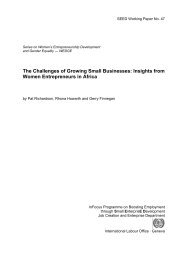manual: women workers' rights and gender equality - International ...
manual: women workers' rights and gender equality - International ...
manual: women workers' rights and gender equality - International ...
Create successful ePaper yourself
Turn your PDF publications into a flip-book with our unique Google optimized e-Paper software.
Reasons often heard for not doing anything against the violation of <strong>rights</strong> of <strong>women</strong>:<br />
• people do not know where to go<br />
• the process is lengthy<br />
• police agents do not listen to <strong>women</strong>, or even worse<br />
• abuse them when they come to the police station<br />
• <strong>women</strong> always lose anyway<br />
• authorities ignore the law <strong>and</strong> do not implement it<br />
With the correct information <strong>and</strong> support from others, the above-mentioned reasons for not doing<br />
anything, can be dealt with.<br />
Explain to the participants that it is better to work in a group against human <strong>rights</strong> violations. Share<br />
the problems with friends or group members <strong>and</strong> try to do something about it as a group. You are<br />
always stronger in a group than alone. The police will listen if a group of people is coming to their<br />
office.<br />
According to the Constitution (article 34), people have another duty <strong>and</strong> that is the duty to exercise<br />
their right to vote at an election. This should be mentioned to the participants as well. Explain why<br />
voting is important.<br />
Tip<br />
Get some case studies of situations in which taking action really made a difference. For example,<br />
check newspaper clippings to find court cases of <strong>women</strong> who complained about violations of <strong>rights</strong><br />
<strong>and</strong> won the case. It stimulates the participants if they hear that taking action really makes a<br />
difference.<br />
It would be very good if you can illustrate the difference between going to the police to file a<br />
complaint <strong>and</strong> going to Court to fight a violation of a constitutional right with real case studies as<br />
well. Look for news clippings on these issues <strong>and</strong> use them as examples under step 7. In this way<br />
the participants will underst<strong>and</strong> better that some basic human <strong>rights</strong> or constitutional <strong>rights</strong> are<br />
more difficult to fight for than other, better defined, <strong>rights</strong> in the several Codes (Penal, Labour or<br />
Civil Codes). For example, if you can prove a rape case, the rapist will be punished according to<br />
the law; the outcome is well defined in national laws <strong>and</strong> regulations. But if you fight for the right to<br />
express yourself freely you are not sure what the outcome will be.<br />
Related sessions <strong>and</strong> briefing notes<br />
4.1 Rights <strong>and</strong> Responsibilities<br />
4.5 Rights of Children <strong>and</strong> Youth<br />
Briefing Note 6 Rights, Laws <strong>and</strong> Rules<br />
51

















